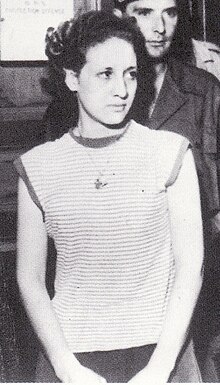Zohra Drif Bitate
Zohra Drif Bitat , Arabic زهرة ظريف بيطاط, (Born December 28, 1934 in Tiaret in the French colony of Algeria ) is an Algerian lawyer and former Vice-President of the Algerian National Council , the upper house of Parliament . Bitat is best known for its commitment to the Algerian National Liberation Front during the Algerian War of Independence .
Life
Youth and education
Zohra Drif was born on December 28, 1934 in Tiaret in the French colony of Algeria into a middle-class, middle-class family. Her father worked as an Islamic legal scholar ( Qādī ) in Vilar (now Tissemsilt). He sent her to the Lycée Fromentin in Algiers for school education . After completing her school career, she studied law at the University of Algiers .
Commitment to the FLN
As part of her studies, especially after Guy Mollet's commitment to Algeria remaining under French control, she began to get involved with the Algerian liberation movement and became a member of the FLN organizational cell for Algiers, the “ Zone Autonome d'Alger ”. On September 30, 1956, the cell was given the task of placing three bombs. In the end, only the bomb that Drif himself had set exploded in the Milkbar café, which is frequented by pied noirs . The bomb killed three young women and injured numerous people.
In January 1957, France declared the " Battle of Algiers ", which mainly hit the FLN cell in Algiers: Various fighters and activists such as Larbi Ben M'hidi were arrested, so that the FLN coordinating committee fled into exile in Tunisia. On September 22, 1957, the French police arrested Drif together with their then boyfriend Yacef Saâdi in their hiding place in the rue Caton in the Kasbah . In August 1958, the Algiers Military Court sentenced Drif to 20 years of forced labor.
After she was initially in Barberousse prison , the French judiciary transferred her to a French prison. Drif herself feared the death penalty for a long time, so in 1960 she wrote her testimony as a 20-page essay under the title La mort de mes frères, in English "The death of my brothers". In 1962, President Charles de Gaulle pardoned Drif as part of Algerian independence. In the same year she married the activist and politician Rabah Bitat and took his name.
After the independence of Algeria
After the independence of Algeria, Drif worked as a lawyer and teacher, at the same time she maintained her political commitment. She was a member of the Algerian Constituent Assembly from 1962 to 1964 and a member of the Algerian National Council, the upper house of Parliament . In the latter, she held the office of Vice-President until 2016, when her mandate was canceled by President Bouteflika . Drif was regarded as a strong critic of the law " Code de la famille " passed by her husband and then President Rabah Bitat , which introduced strong elements of Islamic law into family law.
Private
Drif is the widow of the former Algerian President Rabah Bitat (1925–2000).
Individual evidence
- ↑ a b c Concha Domingo Pérez (ed.): Mujer y desarrollo . Publicacions de la Universitat de València, Valencia 2005, p. 108 f .
- ^ Yves Courrière: La Guerre d'Algérie (1954-1957) . tape 1 . Fayard, 2005, p. 947 f .
| personal data | |
|---|---|
| SURNAME | Bitat, Zohra Drif |
| ALTERNATIVE NAMES | Drif, Zohra |
| BRIEF DESCRIPTION | Algerian lawyer, politician and resistance fighter |
| DATE OF BIRTH | December 28, 1934 |
| PLACE OF BIRTH | Tiaret , French colony of Algeria |
